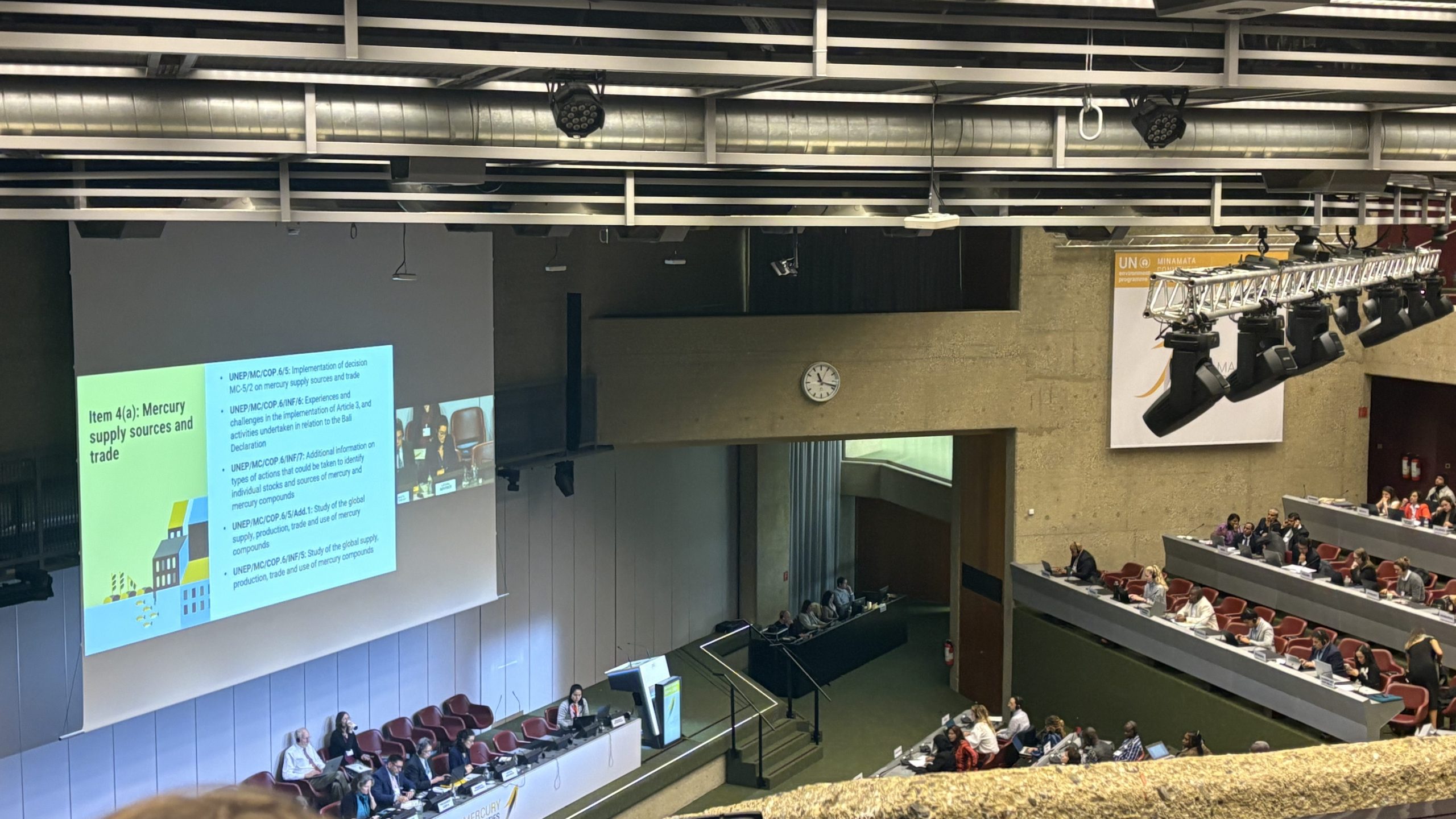By Kiera Bonner
Early Start
On our second day attending the Minamata Convention, we got started bright and early before the plenary session working with the Chemical & Waste Youth Platform run Mercury Youth Task Force to begin finalizing the draft of our Global Youth Declaration on Mercury. Led by advocate Shannon Lisa, we, along with many other members of the group, collaborated to complete the introduction for the declaration. Everyone had a lot of great additions to make in the statement, and we had many discussions on different variables of mercury’s effect on human health all over the world within several distinct groups. Once the introduction was completed, it was time to work on the intervention member Diana Tapie was to announce that afternoon at the plenary session. The intervention was speaking for the mistreatment and violation of rights of millions of women, children, and Indigenous people as a whole, to call for acknowledgement of the enabling illegal gold mining processes—a main cause for these problems they face.
Other Happenings
While we were busy concluding our submission for youth voices to be heard, the halls of COP 6 were nothing short of tense. In one room, the Bureau was working together to prepare for the long day ahead and advise President Osvaldo Álvarez on any issues that may arise along with those which had already made themselves known. Following the Bureau meeting was the bustling of 6 different regional groups— JUSCANNZ, African Regional, Asian and Pacific Group, Eastern European Group, GRULAC Region, and the European Union—breaking off to discuss the issues at hand of the day and possibly come to a general agreement or mutual understanding of interventions to be made at the plenary.
As every day in the convention goes, at 10:00 AM all groups and delegates gather for the morning session of the plenary meeting. Since the first contact group meeting occurred last night, the session began with a recap of the events that took place and the point which the meeting had concluded. At this time, the issue of mercury-added products was the main point of discussion in the Contact Group on technical matters. A phase-out date for imports and exports had yet to be agreed upon, and there was a conclusion to keep both the 2030 and 2034 deadline until a consensus could be reached. Proceeding this discussion was the decision to continue the conversation after the afternoon session at 6:00 PM.
Morning Plenary
Once reviews of the previous day had concluded, the topics proposed and requested by specific parties were brought up. In particular, the requests for extensions and exemptions by Bangladesh and Thailand, and the options for future actions regarding trade in mercury compounds proposed by Canada, Australia, Norway, and Japan. As each subject had significant effects on everyone involved in the convention– and most people on the planet– both sparked long, charged interventions from all speaking parties.

Bangladesh and Thailand, along with the complete support of India, had requested exemptions for at least 6 mercury-added products, which were supposed to be a part of the phase-out. The point was made that alternatives were not accessible enough, and they had not had enough time to do the proper research to deem anything as an absolute reason to eradicate the products in question. There were several groups who disagreed with their reasonings, believing the amount of global research done had been enough to prove proper alternatives, including Sierra Leone who spoke on behalf of the entire African Region and IPEN. As a result of their disagreements, the president (who had previously expressed his wish to keep the contact groups at a minimum) announced there to be a “Friends of Presidents” Group to draft a proper way to achieve the desired exemptions.
The proposed future actions were based around the fact that there weren’t enough regulations on mercury compounds as there were with elemental mercury. To combat this, a CRP was written to propose the establishment of an online expert group between COP 6 and COP 7 to continue working towards the identification of additional mercury compounds. A majority of participants declared their support for these ideas and the CRP or at least the aspirations of the CRP. However, there was some issues coming from India since they wanted more concise guidelines and the timelines were not favorable to their current abilities. As a result, they insisted on a Contact group which they unfortunately did not end up getting.
The morning session did not follow the set schedule for the day, and there were several objectives behind once the final item was addressed before lunch. There have been many moments this convention so far which President Osvaldo Álvarez has expressed his exasperation on parties taking more time than they are welcome to and I feel like that might have been the funniest part of the morning!